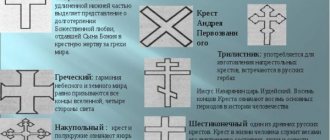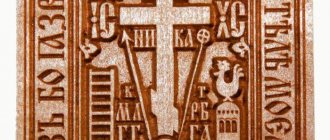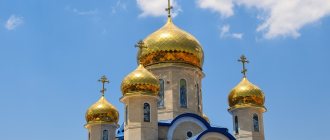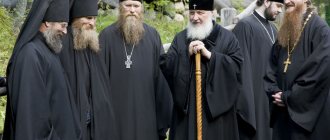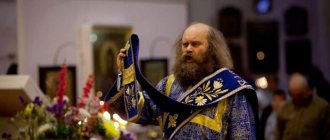Grace of the World
“I very often attend mass; the Liturgy of John Chrysostom is, in my opinion, one of the greatest works. If you follow the service carefully, delving into the meaning of each rite, then you cannot help but be moved in spirit while attending our Orthodox Divine Service.” Such a deeply sincere perception of the Divine Liturgy was expressed by the great Russian composer Pyotr Ilyich Tchaikovsky. In his spiritual writings, he tried to convey this reverent feeling.
The main part of the Liturgy is the Eucharistic canon, or anaphora. We will talk about him, or more precisely, about the chant “Mercy of the World,” performed at this moment.
This most important part of the Liturgy begins with the exclamation of the priest: “Let us become kind, let us become fearful, let us bring holy offerings to the world.” The key word here is “exaltation”, i.e. the offering of the Holy Gifts for their transfusion into the Body and Blood of Christ. The word “in the world” does not refer to the concept of “universe”. “Ascension in the world” means “in peace of mind and with a clear conscience.”
In response, the choir sings on behalf of all those praying: “Mercy of peace, sacrifice of praise.” Here, too, we are not talking about the mercy of the entire universe. These words express the readiness to offer the Bloodless Sacrifice (Holy Eucharist) as the great mercy of God given to us as a result of our reconciliation, that is, peace with God.
Turning his face to the people and blessing them through the closed Royal Doors, the priest says: “The grace of our Lord Jesus Christ, and the love (love) of God and the Father, and the communion of the Holy Spirit be (be) with you all.” In this prayer we are asked from each Person of the Holy Trinity for the highest gift: from the Son - grace, from the Father - love, from the Spirit - communion. The choir, on behalf of the people, answers the priest: “And with your spirit.” A Christian must include in these words an ardent prayer to the Lord for his spiritual father, and the Lord will then bless both the priest and his faithful spiritual son praying for him.
It is important to correctly understand the following exclamation: “Woe is our hearts.” The word "mountain", with the emphasis on the last syllable, means "upwards", "towards the heavens" and has nothing to do with the word "mountain". At this moment our hearts should be directed upward, like fire ascending to the sky.
“Imams to the Lord,” the chorus answers, that is, we have hearts raised up to heaven.
Next the priest calls: “We give thanks to the Lord.”
“It is worthy and righteous to worship the Father, and the Son, and the Holy Spirit, the Trinity, Consubstantial and Indivisible,” answers the choir, and the priest at this time turns to God with the words of secret prayer.
The last words of this prayer sound like this: “Even before You stand thousands of archangels, and thousands of angels, cherubs, and seraphs of six-crylations, many-eyed towering pernatians.” Then the priest pronounces the exclamation: “Singing the song of victory, crying, crying and speaking.”
These words are connected with the previous secret prayer. And the choir, in turn, responds with solemn singing: “Holy, holy, holy is the Lord of hosts, fill heaven and earth with Your glory...”. Thus, at this moment we also add our voice to the angelic singing in heaven.
“Take, eat: this is My Body, still broken for you for the remission of sins,” proclaims the priest, pointing to the Gifts on the throne.
And then: “Drink of it, all of you: this is My Blood of the New Testament, which is shed for you and for many for the remission of sins.” This is a continuation of the words of the Savior spoken by Him at the Last Supper.
And then, raising his hands, he proclaims: “Thine from Thine is offered to Thee for all and for all.”
As Bishop Vissarion (Nechaev) explains, these words must be understood as follows: “we bring You Yours, Your gifts, this bread and this wine - from Yours, that is, chosen from Your countless many gifts, as they were chosen by Your Only Begotten Son Himself at the establishment of the sacrament."
Those present at the Liturgy should turn all their attention inward. The great mystery is about to happen! Nothing should distract us from this most important moment of the Liturgy, when the clergy in the altar pray for the descent of the Holy Spirit. The choir sings quietly and drawn out: “We sing to You, we bless You, we thank You, O Lord, and we pray to You, our God.”
What happens at this moment cannot be described in human language using the images and concepts available to us. This is the greatest secret, penetration into which is impossible for humans. How impossible it is for our minds to comprehend all the boundless love of Christ, who every day again and again sacrifices himself for us for the sake of our Salvation.
Varvara MIKHAILOVA,
teacher of the Ryazan diocesan
women's religious school
What do the words in the liturgy mean: “Mercy of peace, sacrifice of praise”?
Irina Basko
Archpriest Valentin Makarov answers:
– Very often the proskomedia, and sometimes the entire Divine Liturgy, is called the Bloodless Sacrifice. The concept of sacrifice is closely related to the Old Testament. In those days, various animals were brought to the ritual slaughter - in accordance with the requirements of the law on sacrifices. The main task of the priest was to sacrifice these animals to God. Various knives and vessels for blood and entrails were the main tools of that priesthood.
Thank God we are spared the horror of the “meat market before Easter,” but it will be helpful to remember that sin remains alive in our hearts. And where there is sin, there is no peace; where there is sin, there must be a sacrifice. And this Sacrifice - the Sacrifice of Jesus Christ - was offered once for the sins of all people in such a way that it remains impossible for us to add anything to it.
Our sacrifice by the grace of God grew into gratitude, praise and glorification of God for His sacrifice.
Saint Nicholas Cabasilas quotes the following words: “The mercy of peace” is “the fruit of the purest and strongest peace, when the soul is not aroused by any passions and when nothing prevents it from being filled with mercy and the sacrifice of praise.” We have received freely from God a pardon that should have brought peace into our hearts, “because the love of God has been poured out into our hearts through the Holy Spirit who has been given to us” (Rom. 5:5).
Just as the heart of a pardoned criminal must inevitably be filled with joy and peace, so our hearts must experience peace and joy.
According to the teachings of Nicholas Cabasilas, the words “Mercy of peace, sacrifice of praise” sung by the choir at the beginning of the Eucharistic canon call on us to bring “mercy to Him who said: I want mercy, not sacrifice.”
In addition to Divine peace, we must have peace with everyone around us. “So if you are bringing your gift to the altar and there you remember that your brother has something against you, leave your gift there before the altar, and go first and be reconciled to your brother, and then come and offer your gift” (Matt. 5:23,24).
The peace God has given us should be rewarded by reconciliation with our neighbors. In this case, the world will be complete and we will not be condemned in our sacrifice.
What can we render to God for his endless mercy towards us? And what reward does God expect from us more, external or internal? Can a person pay for his salvation with candles or notes? Only praise, only doxology, only thanksgiving coming from the depths of the heart: “the mercy of the world, the sacrifice of praise”...
EXPLANATION OF THE DIVINE LITURGY according to the rite of John Chrysostom (5 pages)
With these words, the deacon once reminded the gatekeepers to watch the doors of the temple, so that none of the catechumens, or pagans, would now penetrate into it. And these words serve as a warning to us, so that we do not allow ourselves any earthly concern, any extraneous thought; so that the doors of our mind and heart are closed from everything external, for it is said:
“You cannot serve God and mammon.”
(Luke 16:13).
The Creed follows:
I believe in one God, the Father Almighty, Creator of heaven and earth, visible to all and invisible.
And in one Lord Jesus Christ, the Son of God, the Only Begotten, Who was born of the Father before all ages: Light from Light, true God from true God, begotten, uncreated, consubstantial with the Father, and by Him all things were.
For our sake, man and our salvation came down from heaven and became incarnate from the Holy Spirit and the Virgin Mary and became human.
He was crucified for us under Pontius Pilate, and suffered and was buried.
And rose again on the third day according to the scriptures.
And ascended into heaven, and sits at the right hand of the Father.
And again the future will be judged with glory by the living and the dead. His Kingdom will have no end.
And in the Holy Spirit, the Lord, the life-giving, who proceeds from the Father, who is worshiped and glorified with the Father and the Son, who spoke the prophets.
Into one Holy, Catholic and Apostolic Church.
I confess one baptism for the remission of sins.
Tea of the resurrection of the dead.
And the life of the next century. Amen.
While singing I Believe , the priest raises and lowers the air over the Gifts, both as a sign of the Holy Spirit soon descending on them, and in memory of the earthquake that shook the earth at that moment when the Lord gave up His spirit on the cross.
At the end of the Creed, the deacon says:
Let us become kind, let us become fearful, and let us bring holy offerings to the world.
Therefore, beloved... let us cleanse ourselves from all filthiness of the flesh and spirit, perfecting holiness in the fear of God.
(2 Cor. 7:1).
Focusing on the memory of the great sacrifice made for us by the Savior, let us behave quietly, with reverence for the Holy Place, so that in complete peace we can offer our sacrifice and prayer to the Lord. What sacrifice is most pleasing to God? The singers answer:
Grace of the world, sacrifice of praise,
that is, the sacrifice that reconciled us with God and for which we must: thank the Lord.
We must be willing to express our love and devotion to the Lord through acts of mercy; This is the most acceptable sacrifice for Him and the most pleasing praise to Him.
Then the priest blesses the people with the words:
The grace of our Lord Jesus Christ, and the love of God and the Father, and the communion of the Holy Spirit, be with you all.
(May the saving power of Christ, the love of the Heavenly Father, and the fellowship of the Holy Spirit be with you.)
And with your spirit.
Woe are our hearts,
that is, let us ascend with our hearts and thoughts to heaven—we will leave everything earthly, everything vain, everything human behind us. Oh, think how solemn this moment is, how sublime this call is, how important our response is at such a moment.
Calling us to participate in the service, the church gradually leads us to the Holy of Holies; and finally, placing us, so to speak, before the Face of God, she asks: “Can you now give your whole heart to the Lord?”
How do we answer this question?
Imams to the Lord!
Everything that the singers sing is said on behalf of all those present; — can we, together with them, in good conscience, answer God: “Yes, we devote ourselves to You, Lord; from this moment we belong entirely to You.”
Oh, it’s better not to be in church at all than at this moment, especially to still give free rein to absent-mindedness or sinful feelings, and to stand indifferently before the Lord! Didn't the Lord say:
Woe to you, Pharisees, hypocrites, because you purify the outside of the cup and platter, while inside they are full of robbery and unrighteousness.
(Matt. 23:25).
“Woe to you, because you honor Me with your lips, while your heart is far from Me! In vain do you honor Me!” Let us not hesitate, let us surrender ourselves completely, sincerely, forever.
Imams to the Lord.
II. After this response from the entire church, the priest invites the believers to thank the Lord with him for the wonderful work of redemption of the human race, as well as for allowing us all to remember him and to perform the sacrament.
“We thank the Lord ,” the priest calls, and we respond with a song of praise to God, from the fullness of our hearts:
It is worthy and righteous to worship the Father and the Son and the Holy Spirit, the Trinity, consubstantial and indivisible.
The sounds of this singing merge with the ringing of the bell, which is heard to notify absent believers about what is happening in the church, and to give them the opportunity to prayerfully move into it, even from afar.
Meanwhile, the priest before the throne quietly offers thanks to God for all His great mercies, and for the fact that a song of praise is received from us sinners, while His throne is surrounded by hosts of sinless Angels who stand before His throne day and night,
(loud). Singing the song of victory, crying, calling and speaking.
These words are taken from the prophet. Ezekiel 1:4-24 and from Rev. John God. 4:6-8, who saw Angels near the throne of God in the form of an eagle (singing), a calf (crying), a lion (calling) and a man (speaking).
These living beings are symbols of Him who sits on the throne: the Supreme One over everything and everyone (eagle), the King of all creation (lion), who incarnated for us (man), and sacrificed Himself (calf) for the sins of the world. Then the singers sing a song of praise to God, as the King of heaven and at the same time the God-man coming to Jerusalem to suffer. The first half of this song is taken from the Angelic Song heard by the Prophet Isaiah when he saw the Lord surrounded by Cherubim and Seraphim.
(Isaiah 6:3).
Holy, Holy, Holy is the Lord of hosts (Lord of hosts)
(Rev. 4:8)
the heavens and the earth are filled with Your glory (who fills the heavens and the earth with Your glory).
The second half is from the enthusiastic words of the Jerusalemites, with which, when the Savior entered Jerusalem on a donkey, throwing Him branches from the trees and spreading clothes along the way, they greeted Him:
Blessed is he who comes in the name of the Lord; Hosanna in the highest!
(Matt. 21:9).
(Blessed is he who walks in the name of the Lord, may our cry be heard in heaven: help, God, hosanna in the highest). At this time, the priest continues in his secret prayers to give praise to God the Savior and, remembering the Last Supper, loudly repeats the words of Jesus Christ:
Take, eat, this is My Body, which was broken for you for the remission of sins.
(Mark 14:22-24).
Drink from it, all of you, this is My Blood of the New Testament, which is shed for you and for many for the remission of sins.
(Luke 22:19-30).
And at this moment we are all transported mentally to the farewell meal of the Savior with His disciples before He went to suffer and die for each of us - and from the depths of our hearts we answer: “Amen,” that is, truly it is so. I know, I believe, I remember that He shed His blood for me, and that only by It can my sins be washed away.
Then, raising the Chalice and Paten with crossed hands and remembering the words of Jesus Christ: do this in remembrance of Me, -
(Luke 22:19)
the priest exclaims loudly:
Yours from Yours brings to You for everyone and for everything.
That is, Your gifts are brought by Your servants, as a propitiatory and grateful sacrifice from all of us, for everything You have done. This raising of the Gifts is called: Ascension.
The believers then sing the continuation of the prayer begun by the priest:
We sing to You, we bless You, we thank You, O Lord, and we pray to You, our God.
At the same time, everyone can bring to mind those countless mercies that he personally experiences day after day, and which are received in such abundance from the hands of God. What wonderful mercy towards us - how many God's answers each of us knows to our prayers, despite our eternal lack of faith and inconstancy; — let us remember His calls, full of love, to which we most often respond by disobedience! How many times a day do we insult Him in word, deed, thought..., how many promises we have broken, what infidelity: obvious and secret sins that are countless! Covered with shame, let us then rush to the One who said that He came to earth
"to seek and save what was lost"
Who has not yet pushed away a single person from Himself since the world existed, but Who, holding out His hands to everyone, says:
“Until now you have asked nothing of Me: ask and you will receive, so that your joy may be complete.”
.
(Luke 19:10. John 16:24).
In the dust at His feet, from the depths of our nothingness and contrition, let us cry:
I offer myself to You, Lord, my will, my thoughts, my strength, my time and everything that is dear to me on earth.
I bring my vicious life and cold heart to Your feet - forgive me and us all, Lord; accept, wash, sanctify in the name of Jesus Christ! We praise You, we thank You, Lord, and we pray to You, our God.
Hegumen Silouan (Tumanov)
This part of my music collection contains the sheet music of “The Grace of Peace” for the Liturgy of St. John Chrysostom and St. Basil the Great, both my compositions and transcriptions of works by other composers.
The first “Mercy of the World” was heard and approved by Deacon Sergius Trubachev, an outstanding composer of the twentieth century, one of whose M. M. was arranged by me for a homogeneous choir. Last year it was successfully performed in the Sretensky Monastery in Moscow under Fr. Viceroy Archimandrite Tikhon (Shevkunov).
If the 1st, 2nd, 3rd, 6th, 7th, 14th, 15th M.M. are entirely my composition, then in the 4th, 5th, 8th, 9th, 10th, 11th, 12th, 13th, 16th, 17th and 18th when writing notes, elements of Znamenny and Old Bulgarian chants were used, taken from the Bulgarian everyday life of P. Dinev or heard on cassettes with recordings of church choirs.
The third MM was called “Zlatoust” because it was written on the day of remembrance of St. John Chrysostom at the Moscow Seminary. Based on its model, other chants were written (litany, Cherubic, “It is Worthy to Eat,” “Now You Let Go”), united by a characteristic musical style.
For solemn liturgies, the MM of the Muses was significantly altered. Dineva. MM music Kovalevsky, Trubachev, Chesnokov and Kedrov-father are rearranged as close as possible to the original. In the “small Pecherskaya” MM a 4th voice was added and the original score was slightly changed. In the “Jerusalem” MM the bass line is expanded, which gives the chant majesty and movement.
“We Sing to You” was written in the partes style for choir and soloist and is intended more for concerts than for worship.
Pavel Esin took a large part in compiling this part of the collection.
, to whom I offer my deepest gratitude.
Content
Mercy of the world No. 1 Mercy of the world No. 2 Mercy of the world (“Zlatoust”) No. 3 Mercy of the world (Old Bulgarian, 1st voice - IS) No. 4 Mercy of the world (Old Bulgarian IS) No. 5 Mercy of the world No. 6 Mercy of the world No. 6 (simplified version) Mercy of the world No. 7 Mercy of the world No. 8 Mercy of the world (arrangement of the Georgian chant - IS) No. 9 Mercy of the world (similar to the “Immaculates” of Holy Saturday of the Moscow chant - IS) No. 10 Mercy of the world (Kiev chant - at the liturgy of St. Basil the Great - IS) No. 11 Mercy of the world (“Easter”) No. 12 Mercy of the world No. 13 Mercy of the world (“Christmas”) No. 14 Mercy of the world (“Makarovskaya”) No. 15 Mercy of the world (Kiev chant - at the liturgy of St. Basil Great - IS) No. 16 Grace of the world (Znamenny chant in the harmony IS) No. 17 Grace of the world (Monastic chant IS) No. 18 Grace of the world (music by P. Dinev - IS) Grace of the world ("Jerusalem" - IS) Grace of the world ( Music by N. N. Kedrov the Father - IS) The Grace of the World (Music by Kovalevsky - IS) The Grace of the World ("Malaya Pecherskaya" - IS) The Grace of the World (Music by Deacon Sergius Trubachev - IS) The Grace of the World (Mus. P. Chesnokova op. 10, No. 4 - IS) The mercy of the world (Mus. P. Chesnokov, Kiev. rosp. Or. 27, No. 6 - IS) “We sing to you” (solo - IS)
Application
Cherubic hymn (“Sofroniyevskaya” - IS No. 1) Cherubic hymn (“Sofroniyevskaya” - A. Kastalsky - IS) Cherubic hymn ("Bogolyubskaya" - IS) Great Doxology (Eastern chant, chapter 1, harmonic P. Dineva - IS) Litany of Petition (model of ancient Roman chant - No. 12 IS)
Story
The emergence of chanting is associated with the spread of the practice of secret reading of the Eucharistic prayers, which arose around the 5th century and was finally consolidated in the 7th-8th centuries.
The chant has undergone a number of changes. Alexander Golubtsov believed that in the ancient rites of the Liturgy of the Apostle James one should read not “mercy” (Greek έλεος), but “oil” (Greek έλαιον). The chant “Worthy and Righteous” was originally recited without further words, which is still the case in modern Greek churches. In Russian printed service books before 1655, this addition is also absent. The corresponding Eucharistic prayer was limited to the words “Worthy and righteous.” Until the 17th century, the song “Holy, holy, holy is the Lord of hosts, fill heaven and earth with Your glory; Hosanna in the highest, blessed is He who comes in the name of the Lord, Hosanna in the highest” was limited to the words “Holy, holy, holy.” The chant “We sing to You” is presumably a late artificial addition, since it has no connection with the Eucharistic prayer.
Anaphora (Eucharistic canon) of St. John Chrysostom
Upon pronouncing this anaphora, bread and wine are transformed into the Body and Blood of Christ. The Eucharistic canon is read at the altar by the priest; in some churches, believers hear only exclamations that are specially marked.
Deacon: Let's become kind, let's become fearful, let's take in the holy offering in the world!
Chorus: Mercy of the world, sacrifice of praise.
Priest: The grace of our Lord Jesus Christ, and the love (love) of God and the Father, and the communion (communion) of the Holy Spirit be with you all.
Choir: And with your spirit.
Priest: Woe is our heart.
Chorus: Imams to the Lord.
Priest: We thank the Lord.
Chorus: It is worthy and righteous to worship the Father, and the Son, and the Holy Spirit, the Trinity, Consubstantial and Indivisible.
Priest (quietly): It is worthy and righteous to sing to You, to bless You, to praise You, to thank You, to worship You in every place of Your dominion; For you are God, ineffable, unknown, invisible, incomprehensible, everlasting, and likewise; You and Your Only Begotten Son and Your Holy Spirit; Thou hast brought us from non-existence into being, and Thou hast restored those who had fallen away, and Thou hast not retreated, creating everything, until Thou hast raised us to heaven and Thou hast granted Thy Kingdom to the future. For all of these we thank Thee, and Thy Only Begotten Son, and Thy Holy Spirit, for all, their known and their unknown, manifest and unmanifested blessings that have been upon us. We thank Thee also for this Service (Greek Liturgy), which Thou hast deigned to receive at our hands, even though thousands of archangels and scores of angels stand before Thee, cherubs and seraphim, hexacrylates, many eyes, towering pernatia, ( proclaims:) singing a victorious song, crying out , calling and speaking!
Choir: Holy, holy, holy, Lord of hosts! Fill heaven and earth with Your glory; Hosanna in the highest, blessed is he who comes in the name of the Lord, Hosanna in the highest.
Priest (quietly): With these divine powers we too, O Lord, most loving of mankind, cry out and say: Holy and holy are You, and Your Only Begotten Son, and Your Holy Spirit; Thou art holy and most holy, and magnificent is Thy glory, for Thou didst so love Thy world, even as He gave Thy only begotten Son, that whoever believes in Him should not perish, but have eternal life: Who came and fulfilled all His cares for us in the night, having given yourself over in vain, and even more so giving yourself over to yourself for your worldly life, take the bread into your holy and most pure and immaculate hands, thanking and blessing, sanctifying, breaking, giving to your saints, disciple and apostle, the river (exclamation): Take, eat, this is My body, broken for you for the remission of sins!
Chorus: Amen.
Priest (quietly) Like the cup at supper, saying (exclamation): Drink of it, all of you, this is My blood of the new testament, which is shed for you and for many for the remission of sins!
Chorus: Amen.
Priest: (quietly) Remembering now this saving commandment, and everything that was about us: the cross, the tomb, the three-day resurrection, the ascension to heaven, sitting on the right hand, the second and glorious coming again (proclaims): Thine from Thine, brought to Thee by everyone and everything!
Chorus: We sing to You, we bless You, we thank You, O Lord, and we pray to You, our God.
Priest (quietly): We also offer You this verbal and bloodless Service (Liturgy), and we ask, and we pray, and we pray: send down Your Holy Spirit on us and on these Gifts that are set before us.
Lord, who sent down Your Most Holy Spirit at the third hour by Your Apostle, do not take Him away from us, O Good One, but renew us who pray to You.
Deacon: Create in me a pure heart and renew a right spirit in my womb.
Priest: Lord, who sent down Your Most Holy Spirit at the third hour by Your Apostle, do not take Him away from us, O Good One, but renew us who pray to You.
Deacon: Do not turn me away from Your Face and do not take Your Holy Spirit from me.
Priest: Lord, who sent down Your Most Holy Spirit at the third hour by Your Apostle, do not take Him away from us, O Good One, but renew us who pray to You.
Deacon: Bless, Vladyka, the holy bread.
Priest: and make this bread the honorable Body of Thy Christ.
Deacon: Amen. Bless, Master, the holy cup.
Priest: And in this cup is the precious Blood of Thy Christ.
Deacon: Amen. Bless the wallpaper, O Lord.
Priest: By Your Holy Spirit.
Deacon: Amen, amen, amen.
Priest: How to be a communicant for the sobriety of the soul, for the remission of sins, for the communion of Your Holy Spirit, for the fulfillment of the Kingdom of Heaven, for boldness towards You, not for judgment or condemnation.
We also offer to You this verbal Service about those who died in the faith: forefathers, fathers, patriarchs, prophets, apostles, preachers, evangelists, martyrs, confessors, abstinents, and about every righteous soul who died in the faith, (he proclaims :) fairly about the Most Holy One, most pure, most blessed, most glorious to our Lady Theotokos and Ever-Virgin Mary!
Choir: It is worthy to eat as truly you bless Thee, the Mother of God, the Ever-Blessed and Most Immaculate and the Mother of our God. We magnify You, the most honorable Cherub and the most glorious without comparison Seraphim, who gave birth to God the Word without corruption.
Priest (quietly): About Saint John the Prophet, Forerunner and Baptist, about the glorious and all-praised Apostles, about the Holy Name, whose memory we commemorate, and about all Your saints, whose prayers visit us, O God.
And remember all the departed about the hope of the resurrection of eternal life (lists by name of those remembered). And give them rest, where the light of Thy face shines.
We also pray to Thee, remember, O Lord, every Orthodox bishopric, the right of those who rule the word of Thy truth, every presbytery, the deaconate in Christ and every priestly order.
We also bring to You this verbal service about the universe, about the saints, the catholic and apostolic Church, about those who live in purity and honor, about our God-protected country, its authorities and army. Grant them, Lord, a peaceful reign, and in their silence we too will live a quiet and silent life, in all piety and purity.
Priest (proclaims): First remember, Lord, our great lord and father (name) , His Holiness the Patriarch of Moscow and All Russia, and our lord (High) Eminence (name and title of the ruling bishop, archbishop or metropolitan) , grant them to the Saints To Your churches in peace, whole, honest, healthy, long-living, the right of those who rule is the word of Your truth!
Chorus: And everyone and everything.
Priest: Remember, Lord, this city in which we live, and every city and country, and those who live in them by faith.
Remember, Lord, those sailing, traveling, the sick, the suffering, the captives, and their salvation.
Remember, Lord, those who bear fruit and do good in Your holy churches, and those who remember the poor, and send down Your mercies on all of us (lists by the names of those remembered). .
And grant us with one mouth and one heart to glorify and glorify Your most honorable and magnificent Name: the Father and the Son and the Holy Spirit, now and ever and unto ages of ages!
Chorus: Amen.
Priest (facing the people): And may the mercies of the Great God and our Savior Jesus Christ be with you all!
Choir: And with your spirit.
.




